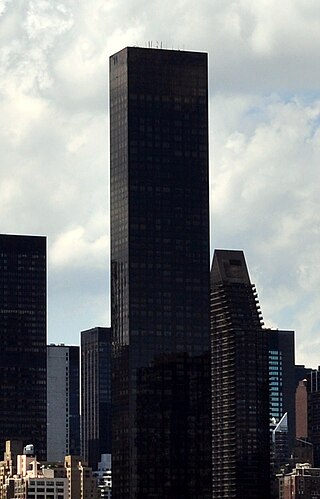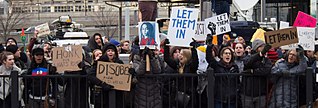Related Research Articles

Trump World Tower is a residential condominium building in the Turtle Bay neighborhood of Midtown Manhattan in New York City. The tower is located at 845 United Nations Plaza, on First Avenue between 47th and 48th Streets. It was developed by Donald Trump and was constructed between 1999 and 2001.

The Trump Organization is an American privately-owned conglomerate owned by Donald Trump. It serves as the holding company for all of Trump's business ventures and investments, with around 250 of its affiliates and subsidiaries using the Trump name. Donald Trump joined the organization in 1968, began leading it in 1971, renamed it around 1973, and handed off its leadership to his children in 2017 after he won the 2016 United States presidential election.
IRAP may refer to:

The Dominick, formerly the Trump SoHo, is a $450 million, 46-story, 391-unit hotel condominium located at 246 Spring Street at the corner of Varick Street in the Hudson Square neighborhood of Manhattan, New York City. It was announced in 2006, completed in 2008 and renamed in 2017.
The Urban Justice Center is a non-profit legal services and advocacy organization serving the New York City area. It is known as an incubator for progressive programs and initiatives and for being a significant legal presence in the struggles of New York's poverty stricken and minority populations. Urban Justice Center won the 2020 Webby People's Voice Award for Law in the category Web.

Stephen Miller is an American political advisor who served as a senior advisor for policy and White House director of speechwriting to President Donald Trump. His politics have been described as far-right and anti-immigration. He was previously the communications director for then-Senator Jeff Sessions. He was also a press secretary for U.S. representatives Michele Bachmann and John Shadegg.

Immigration policy, including illegal immigration to the United States, was a signature issue of former U.S. president Donald Trump's presidential campaign, and his proposed reforms and remarks about this issue generated much publicity. Trump has repeatedly said that illegal immigrants are criminals.

Executive Order 13769, titled Protecting the Nation from Foreign Terrorist Entry into the United States, labeled the "Muslim ban" by Donald Trump and his supporters and critics alike, and commonly known as such, or commonly referred to as the Trump travel ban, or Trump Muslim travel ban, was an executive order by President Trump. Except for the extent to which it was blocked by various courts, it was in effect from January 27, 2017, until March 6, 2017, when it was superseded by Executive Order 13780, a second order sharing the title "Protecting the Nation from Foreign Terrorist Entry into the United States".

In late January and early February 2017, during protests against Executive Order 13769, thousands of people gathered at various airports in the United States and around the world to prevent the returning of refugees and other visitors from seven countries considered to be unsafe. According to various sources, more than two thousand people were at the protest at John F. Kennedy International Airport in Queens, New York City with other protests appearing at significant international airports and other important sites around the United States. Protests continued daily and internationally through February 6. Protests also continued after a federal judge issued a temporary restraining order against parts of the travel ban.

Executive Order 13769 was signed by U.S. President Donald Trump on January 27, 2017, and quickly became the subject of legal challenges in the federal courts of the United States. The order sought to restrict travel from seven Muslim majority countries: Iran, Iraq, Libya, Somalia, Sudan, Syria, and Yemen. The plaintiffs challenging the order argued that it contravened the United States Constitution, federal statutes, or both. On March 16, 2017, Executive Order 13769 was superseded by Executive Order 13780, which took legal objections into account and removed Iraq from affected countries. Then on September 24, 2017, Executive Order 13780 was superseded by Presidential Proclamation 9645 which is aimed at more permanently establishing travel restrictions on those countries except Sudan, while adding North Korea and Venezuela which had not previously been included.
Many organizations reacted to the enactment of Executive Order 13769, titled "Protecting the Nation from Foreign Terrorist Entry into the United States," which was an executive order issued by United States President Donald Trump. Domestically, the order was criticized by Democratic and Republican members of Congress, universities, business leaders, major corporations, Catholic bishops, and Jewish organizations. Some 1,000 U.S. diplomats signed a dissent cable opposing the order, setting a record. Public opinion was divided, with initial national polls yielding inconsistent results. Protests against the order erupted in airports and cities.

The Trump travel ban denotes a series of executive actions taken by Donald Trump as President of the United States, beginning with Protecting the Nation from Foreign Terrorist Entry into the United States.
The Central American Minors (CAM) Refugee and Parole Program is a U.S. refugee and parole program established in November 2014 by the Obama administration. It is a refugee protection and family reunification pathway on which several thousand families rely and for which tens of thousands more families are technically eligible. The CAM Program was designed to permit certain children and other eligible family members to escape life-threatening danger and other humanitarian crises and to reunite with parents or relatives in the United States. This program provides certain qualified parents and legal guardians to apply for their children and other eligible family members, who are nationals of and physically present in El Salvador, Guatemala, and Honduras, to come to the United States as refugees or parolees. The CAM Program has been operational from 2014 to 2017-18 when it was terminated over a series of actions; and from 2021 to the present, when it was restarted in two phases, first for some previously closed cases and then for new applications. To date, most CAM Program beneficiaries have been Salvadoran families of Temporary Protected Status (TPS) holders, making up 86 percent of applicants from the 2014–2017. Since the Biden administration restarted the CAM Program for new applications, the CAM Program has had expanded eligibility criteria, including parents and guardians with pending asylum applications or U visa petitions, which should enable many more Guatemalans and Hondurans to apply.

Executive Order 13780, titled Protecting the Nation from Foreign Terrorist Entry into the United States, was an executive order signed by United States President Donald Trump on March 6, 2017. It placed a 90-day restriction on entry to the U.S. by nationals of Iran, Libya, Somalia, Sudan, Syria and Yemen, and barred entry for all refugees who did not possess either a visa or valid travel documents for 120 days. This executive order—sometimes called "Travel Ban 2.0"—revoked and replaced Executive Order 13769 issued on January 27, 2017.

International Refugee Assistance Project v. Trump, 883 F. 3d 233, was a decision of the United States Court of Appeals for the Fourth Circuit, sitting en banc, upholding an injunction against enforcement of Proclamation No. 9645, titled "Enhancing Vetting Capabilities and Processes for Detecting Attempted Entry Into the United States by Terrorists or Other Public-Safety Threats", a presidential proclamation signed by President Donald Trump on September 24, 2017. The proclamation indefinitely suspends the entry into the U.S. of some or all immigrant and non-immigrant travelers from eight countries. It is a successor to Executive Order 13769, entitled "Protection of the Nation from Terrorist Entry into the United States," which were also enjoined by the District Court of Maryland and the Fourth Circuit in a case decided in 2017 by the same name of International Refugee Assistance Project v. Trump, 857 F.3d 554.
65 Bay Street is a 50-story apartment tower, originally named Trump Bay Street after Donald Trump and located at 65 Bay Street in Jersey City, New Jersey. It is located adjacent to the Trump Plaza apartment tower, which was completed in 2008. A second Trump Plaza tower had initially been planned but was delayed, and the property for the proposed building was sold several times during the Great Recession.
Rebecca Heller is an American lawyer specializing in human rights. She is known for her opposition to the Trump travel ban, and for her work providing legal assistance to refugees through the International Refugee Assistance Project, which she co-founded and directs.
Tali Farimah Farhadian Weinstein, is an American attorney, professor, and politician. She is a former federal and state prosecutor and was a candidate in the 2021 New York County District Attorney race.
Climate migration is a subset of climate-related mobility that refers to movement driven by the impact of sudden or gradual climate-exacerbated disasters, such as "abnormally heavy rainfalls, prolonged droughts, desertification, environmental degradation, or sea-level rise and cyclones". Gradual shifts in the environment tend to impact more people than sudden disasters. The majority of climate migrants move internally within their own countries, though a smaller number of climate-displaced people also move across national borders.
References
- ↑ "Mission & Values". International Refugee Assistance Project. Retrieved May 25, 2017.
- ↑ Silow-Caroll, Andrew (April 6, 2016). "Meet the 'intensely neurotic' Jew saving the world's refugees". Times of Israel .
- ↑ 2019 Report to Supporters (PDF) (Report). International Refugee Assistance Project. p. 29.
- ↑ "Our Team". International Refugee Assistance Project. Archived from the original on September 24, 2020. Retrieved May 25, 2017.
- ↑ Shear, Michael D.; Kulish, Nicholas; Feuer, Alan (January 28, 2017). "Judge Blocks Trump Order on Refugees Amid Chaos and Outcry Worldwide". The New York Times.